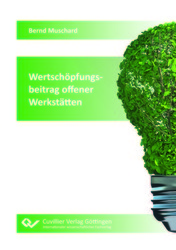| Areas | |
|---|---|
| Serie de libros (97) |
1381
|
| Nachhaltigkeit |
3
|
| Gesundheitswesen |
1
|
| Letra |
2369
|
| Ciencias Naturales |
5408
|
| Ciencias Ingeniería |
1795
|
| Ingeniería | 292 |
| Ingeniería mecánica y de proceso | 862 |
| Ingeniería eléctrica | 688 |
| Mineria y metalurgía | 30 |
| Arquitectura e ingeniería civil | 75 |
| General |
98
|
|
Leitlinien Unfallchirurgie
5. Auflage bestellen |
|
Erweiterte Suche
Wertschöpfungsbeitrag offener Werkstätten (Tienda española)
Bernd Muschard (Autor)Previo
Lectura de prueba, PDF (170 KB)
Indice, PDF (110 KB)
Sogenannte offene Werkstätten oder auch Makerspaces stellen ein weltweit verfolgtes Konzept für nachhaltige Wertschöpfungsbeiträge dar. Sie bieten einen offenen Zugang für zivilgesellschaftliche Akteure, an kollaborativen Wertschöpfungsprozessen teilzuhaben, produktionstechnische Kompetenzen zu erwerben und Wertschöpfungsprozesse selbstbestimmt auszuführen. Durch die Bereitstellung produktionstechnischer und sozialer Infrastrukturen bieten sie das Potential, technische und soziale Innovationen zu fördern. Die vorliegende Dissertation unternimmt den Versuch, den Nutzen offener Werkstätten für den Akteur, die akademische Lehre und die Gesellschaft aufzuzeigen und Chancen zu bestimmen, wie offene Werkstätten dazu beitragen können, das Ziel des transformativen Wandels zu in Richtung nachhaltiger Gesellschaften und Wirtschaften zu fördern. Es wird ein Modell erarbeitet, das die Entwicklungsmöglichkeiten offener Werkstätten umreißt, den individuellen, gesellschaftlichen, ökonomischen und ökologischen Nutzen identifiziert und dadurch ihre Potentiale für den transformativen Wandel beschreibt. Offene Werkstätten werden im Prozess der Demokratisierung von Wissen und Technik betrachtet. Am exemplarischen Beispiel eines universitären Makerspaces werden die Entwicklungsoptionen mit transformativem Potential ausführlich beschrieben.
So called open workshops or Makerspaces represent a concept for sustainable value creation that is pursued worldwide. They offer open access for civil society protagonists to participate in collaborative value creation processes, to acquire technical production competencies and to carry out value creation processes independently. By providing a production-technical and social infrastructures, they offer the potential to promote technical and social innovations. This dissertation attempts to demonstrate the benefits of open workshops for the user, academic education and society, and to identify opportunities for how open workshops can contribute to promote the goal of transformative change towards sustainable societies and economies. A model is developed that outlines the development opportunities of open workshops, identifies the individual, societal, economic and ecological benefits and thereby describes their potentials for transformative change. Open workshops are analyzed in the process of democratizing knowledge and technology. Development options with transformative potential are described in more detail using the exemplary application of a university makerspace.
| ISBN-13 (Impresion) | 9783736976276 |
| ISBN-13 (E-Book) | 9783736966277 |
| Formato | A5 |
| Idioma | Alemán |
| Numero de paginas | 188 |
| Laminacion de la cubierta | mate |
| Edicion | 1. |
| Lugar de publicacion | Göttingen |
| Fecha de publicacion | 09.06.2022 |
| Clasificacion simple | Tesis doctoral |
| Area |
Ciencias Ingeniería
|
| Palabras claves | Offene, Werkstätten, Makerspace, FabLab, Hackerspace, Maker, Prosument, Infrastruktur, Vermittlung, Kompetenz, Demokratisierung, Fertigung, Personal Fabrication, Produktionstechnik, Nischenaktivität, DIY, Do-It-Yourself, DIWO, Do-It-With-Others, learning-by-doing, nachhaltige, materielle, ideelle, Wertschöpfung, Wertschöpfungsprozess, Nachhaltigkeit, Nutzen, Beitrag, Produkte, Potential, Transformativer Wandel, Agenda 2030, Open, workshops, makerspace, FabLab, hackerspace, maker, prosumer, infrastructure, mediation, competence, democratization, manufacturing, personal fabrication, production technology, niche activity, DIY, Do-It-Yourself, DIWO, Do-It-With-Others, learning-by-doing, sustainable, material, ideal, value creation, value creation process, sustainability, benefit, contribution, products, potential, Transformative Change, Agenda 2030, Montagetechnik, assembly technology, Fabrikbetrieb, Transformativer Wandel, nachwachsende Rohstoffe, renewable resources, Treibhausgasneutralität, greenhouse gas neutrality, Repair Cafés, Konsummuster, consumption patterns, globale Entwicklungsprobleme, global development problems, Konsumverhalten, consumer behaviour, lokale Gründerkultur, local start-up culture, Schwarmfinanzierung, crowdfunding, Lernen durch Fertigen, learning-by-making, Sharing Economy |








